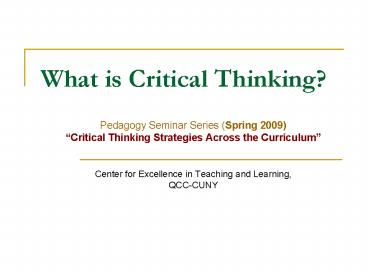What is Critical Thinking - PowerPoint PPT Presentation
1 / 9
Title: What is Critical Thinking
1
What is Critical Thinking?
- Pedagogy Seminar Series (Spring 2009)
- Critical Thinking Strategies Across the
Curriculum - Center for Excellence in Teaching and Learning,
- QCC-CUNY
2
What is Critical Thinking?
- Critical thinking is a descriptive phrase that
refers to a collection of - overlapping mental activities in order to
evaluate the credibility, - quality, impact, significance, usefulness or
desirability of an entity. - The evaluation is usually based on an implicit or
explicit value - system and a set of criteria.
- The entity being evaluated can be a knowledge
claim, a research - article, a work of art, a proposal, a social
practice, an institution, a - person, and so on. Instead of an unquestioning
adoption of ideas, - the goal of critical thinking is to pay attention
to both the positive - and the negative aspects of what is being
evaluated.
Centre for Development of Teaching Learning,
CDTL NUS
3
Collection of overlapping mental activities
Clarifying
Reflecting
Judging
Critical Thinking
Inferring
Intuiting
Connecting
4
Types of Critical Thinking
Academic Domain
Critical Thinking
Ability to evaluate the credibility
of discipline-specific research findings, claims,
frameworks, ideas, etc.
Public Domain
Professional Domain
Ability to evaluate ideas policies, formulate
informed opinions, participate in public matters
as responsible citizens
Ability to Evaluate options (evaluating career
prospects)
Private Domain
Ability to evaluate options in ones private
life (Making an informed decision whether to
undergo surgery)
5
Elements of Critical Thinking
http//academic.udayton.edu/LegalEd/CTSkills/CTski
lls02.htmelements
6
Blooms Taxonomy of Higher Thinking
One of the most influential of the critical
thinking models is Bloom's Taxonomy of Higher
Thinking. Bloom categorized thinking into the
following six processes
Evaluation
To be able to judge.
Synthesis
To connect the knowledge with other knowledge.
To break information down to smaller parts and to
see how the parts work together.
Analysis
Application
To find some practical use for the information.
Comprehension
To understand what it means.
Knowledge
To have a fact or bit of information at your
disposal. One can "know" something without
understanding it or being able to put it into a
higher context.
7
Critical Thinking Across the Curriculum
- Because virtually all courses in the curriculum
intend to use techniques - of critical thinking and to improve students
critical thinking abilities, this - seminar will focus on the following objectives
- developing usable critical thinking strategies to
enrich courses - incorporating critical thinking techniques in
writing assignments to improve the quality of
submissions - challenging students to probe concepts more
energetically in class discussions - testing critical thinking abilities in quizzes
and exams
8
Critical Thinking Strategies and Pedagogical
Choices
- Lectures Periodically ask students thoughtful
questions about the material you have just
presented and suggest how the information can be
used - Laboratories Students learn the scientific
method by actually practicing it. - Homework Both traditional homework and online
practice sets or questions can be used to enhance
critical thinking. - Quantitative Exercises Math exercises and
quantitative word problems teach problem solving
skills that can be used in everyday life. - Term Papers Students acquire, synthesize, and
logically analyze information and then present
their conclusions in written form. - Exams Both essay question exams and
multiple-choice exams promote critical thinking.
9
What Is Critical Thinking?
- A Set of Values
- Thinking for yourself, as compared to accepting
unquestioningly what others want you to believe. - Exploring new ideas, points of view and
possibilities. - Using reason to investigate questions, evaluate
ideas, advocate positions, and resolve conflicts. - Including the voices and perspectives of diverse
groups in the discussion of issues. - Weighing ideas based on their merits, not who
advocates them. - Achieving the best possible resolution of
questions - A Set of Skills
- Inquiry Skills the ability to frame questions
and gather information. - Understanding evaluation skills the ability
to understand others ideas and evaluate
arguments offered in support of them. - Advocacy Skills the ability to formulate
positions and support them in a manner that
promotes reasoned discussion.































